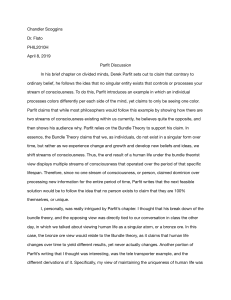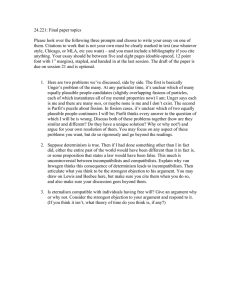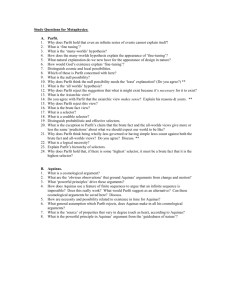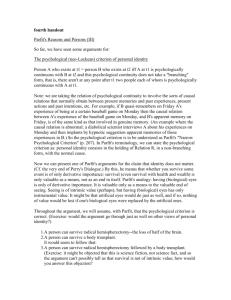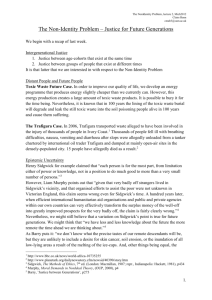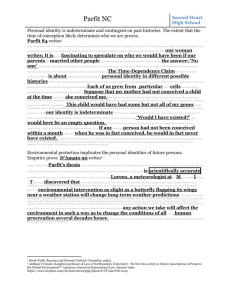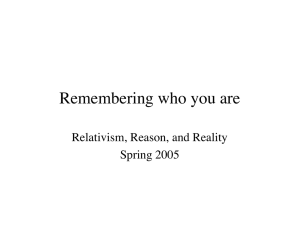Document 13519483
advertisement
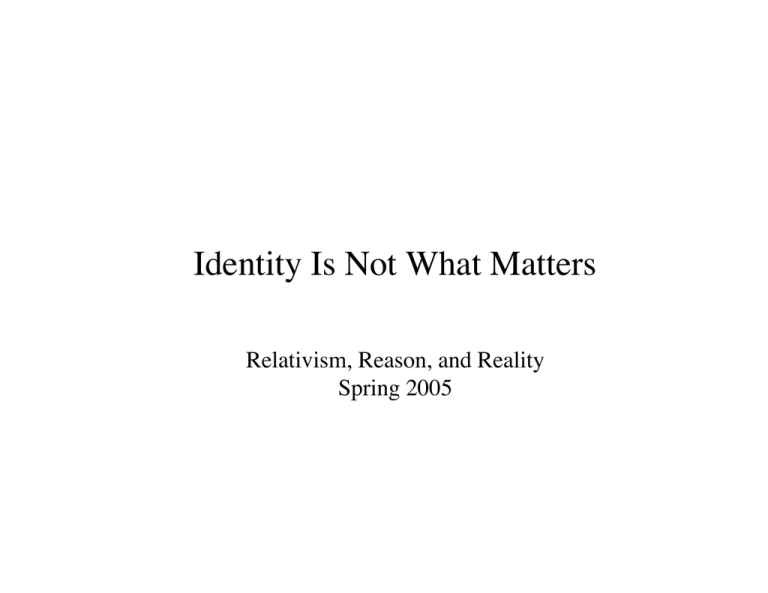
Identity Is Not What Matters Relativism, Reason, and Reality Spring 2005 Why it doesn't matter • Identity we are told is relation R holding in nonbranching form with its normal cause. • Neither Lefty nor Righty is identical to you by that standard. • But nothing intrinsically important is gained if Righty never comes into being, so that Lefty is you after all. • Similarly nothing important is gained if Righty comes into being three minutes later, after "your" identity has a chance to take hold. What does matter? • Something that is preserved when you're succeeded by Lefty and Righty both. • Options: – R with its normal cause – R with any reliable cause – R with any cause – R even uncaused – Not even R (the Extreme Claim, 307-12) • Parfit flirts with "not even R" but seems to opt in the end for "R with any cause" (287). "R with any cause" as what matters • Parfit grants this leads to counterintuitive results in some cases, but thinks the intuitions dissipate when we fully assimilate the truth about what we are. • Here are some awkward-looking cases with Parfit's actual or possible attempt at dissipation. Teletransportation • Teletransportation involves R with any cause, so it preserves what matters but not identity (which requires the normal cause) • If he is right "transportation" is a misnomer. It's like making a photocopy with the original being destroyed • Shouldn't copying-with-death be feared? • No, he says: identity fails because the cause is abnormal. That "cannot matter"; "It is the effect which matters" (286). • Analogy: Yout first think it a great loss to lose your eyes - but not if you were given an alternative basis for vision Not so fast • Causes can matter too! • Is s/he saying it out of love or to avoid hurting your feelings? Is s/he even there? • Parfit in saying "only the effect matters" is inviting us to compare R to vision. • But an invitation is not an argument. • Why shouldn't we compare it to cases where the cause is crucial? The branch-line case • This is teletransportation that destroys you a short time after making your replica • Your replica is on Mars; you will die in a few hours; isn't it rational to be worried -- anyway more worried than if it was the replica that was going to die? • Not according to Parfit. He supports this with an analogy. The sleeping pill • It puts you to sleep in an hour; you wake up remembering the first half-hour but not the second. • Here I am in the second half-hour. • Don't I care egoistically about the person who wakes up? • Yet his psychological connections are to my former self, not my present self -- just like in the branch line case. Is the analogy good? • Hold on: the person who wakes up is me!! Maybe that's why I care. • But suppose he's right that the cases are analogous. • That just shows we have to treat the two cases alike. There are two ways to do it. • Maybe our view of the second case should be changed to agree with our view of the first! Murder while asleep • Mad Scientist scans your sleeping brain at 12am; she downloads your complete (quasi-)psychology into a waiting body. • The process is finished at 3am; your replica lies with you in bed until 8am. • You (still asleep) are given a lethal injection at 8am and incinerated. • Your replica rises at 9am to enjoy a bowl of Froot Loops Good analogy? • This is a kind of branch-line case • Parfit should say nothing has been lost. • But to be incinerated unawares is horrible! • He could argue that if you knew the whole setup beforehand, you wouldn't greatly care. • And isn't the better-informed judgment more to be trusted than the less-informed? Duplication by coincidence • A replica of you might occur by coincidence, as someone might unknowingly paint a Mona Lisa. • S/he is R-related to you with no cause, so Parfit would say what matters is lost. • But his own analogy suggests a different answer. • He says it doesn't matter if a cause is unreliable; it's like an unreliable cure that works; all that matters is you wake up healthy. • But of course all that matters is you recover, not that the treatment caused you to recover! • To judge by his analogy, "no cause" is good enough - so the coincidental replica preserves what matters! Teletransportation by coincidence • Just like the branch-line case, but you never step into the device • You learn that you will shortly die -however a person just like you has accidentally been fabricated on Mars. • If what matters is R with no cause, there is nothing to fear; your fluky replica alive tomorrow is just as good as you alive. Trivial differences • Parfit thinks that trivial differences can't matter; that is why branch-line is no worse than regular teletransportation • Is he right? Two questions: – Why should significance flow up from the details, rather than the details acquiring significance by their association with higher level results? (Music, poetry, …) – If we do in fact prefer Y to trivially different X, how can that be irrational? Surely it is up to us what we care about?
